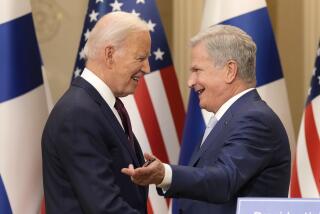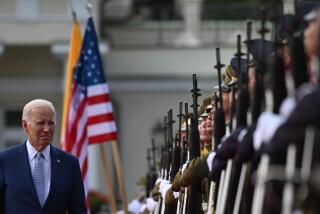Bush Says It’s Too Early for Ties to Baltics
- Share via
KENNEBUNKPORT, Me. — President Bush said Monday that the march toward independence by Soviet republics has become “inexorable” but insisted that it is not yet time for the United States to join the rush toward formal recognition of the break-away Baltic states.
The cautious stance reflects what Bush described as his concern that too “precipitous” a move by the United States could nudge a highly fluid Soviet Union further toward dissolution and disorder.
While the President said that his Administration is “moving very, very close to recognition,” its refusal for now to establish full diplomatic relations with Lithuania, Latvia and Estonia leaves the White House lagging behind some of its closest allies.
But with the Ukraine and other republics lining up to follow the Baltics down the path of self-rule, the President vowed to avoid the “mistake of contributing to some kind of anarchy inside the Soviet Union.”
Administration officials said the White House is concerned that any action that would preempt the Soviet Union in declaring independence for the Baltics could be interpreted by breakaway Soviet forces as an invitation to further fragmentation.
In an afternoon news conference, the President played down the prospect of a Soviet plunge toward anarchy. But his comments betrayed the discomfort among his senior advisers about any U.S. move that could accelerate the unraveling of the Soviet Union.
“We want to see what we’re running against in terms of order,” Bush said, defending his go-slow approach on the Baltics and on aid to Moscow. In a telling slip of the tongue, he characterized the unfolding events in the Soviet Union as a “quest for freedom, democracy and turmoil.”
The President’s refusal to extend formal diplomatic recognition to the three Baltic republics came as Canadian Prime Minister Brian Mulroney, winding up an overnight visit here, announced that his government would accept their declarations of independence.
Bush said that he is comfortable with the Canadian decision and added that “special responsibilities” make it necessary for the United States to act with greater caution. But the sharp contrast in the positions taken by the two allies was apparent after discussions that Bush described as having been in the “best tradition of diplomacy.”
In a small gesture of support to Moscow, the White House moved Monday to extend $315 million in agricultural credits to the Soviet Union as a second installment in a program announced earlier this summer.
But Bush was blunt in seeking to silence calls for new cash assistance to the Soviets. Before the United States extends such aid to a nation whose future course and structure remain uncertain, he said, “I’d like to see a few more cards on the table.”
A senior State Department official will attend a special meeting of the Group of Seven industrialized democracies this week in London to discuss the prospect of new Western aid. But Bush made clear that his government intends to do little more than “listen.”
“The United States is not going to precipitously commit to various things until we know a little more about what’s happening,” Bush said.
In refusing for now to reach out to the Baltics but insisting that his Administration remains on the side of independence, the President seemed to be striving to maintain a delicate balance on what has become a highly sensitive issue.
While the United States has never recognized the forced annexation of Lithuania, Latvia and Estonia into the Soviet Union in 1940, it has not maintained full diplomatic relations with the three republics since that time. There are no U.S. embassies or diplomats in the Baltic states, although the three republics have official envoys in Washington.
Still, the United States has long been a leading advocate of independence for the Baltics, and its embrace of self-determination sends a signal of endorsement to other Soviet republics seeking to break away from the center.
But what the President acknowledged as an “inexorable” drive toward independence is seen as posing such enormous complications that he and his advisers remain fearful of making any move that might accelerate it.
“Let’s do nothing to interfere or hold back independence or freedom or a right to be independent,” Bush said at his news conference, held on the grounds of Walker’s Point, his family compound here.
But he said that it would be “too much” to expect decisive action by the United States “at the end of a week that’s moved this fast.” He said it remains “murky” whether the Soviet Union is now headed toward a fundamental breakup. As one Soviet republic after another declares its independence, Bush cautioned, “we want to see what we’re talking about in terms of order.”
The President is scheduled to meet today with his senior foreign policy advisers for the first time since a coup d’etat by Communist right-wingers against the administration of President Mikhail S. Gorbachev and its subsequent dramatic reversal thrust the Soviet Union into extraordinary upheaval.
The senior officials, including Defense Secretary Dick Cheney, are to hear from Robert S. Strauss, the U.S. ambassador to the Soviet Union. Strauss was sworn in to his new job and sent to Moscow in such haste that he was turned away from the State Department when he sought to enter the building Monday morning because he lacked the proper pass.
Bush’s remarks at the news conference marked his first formal comments about events in the Soviet Union since last Thursday. In the face of what amounts to the dissolution of the Communist Party, he spoke with particular vehemence about the Soviet “quest for freedom.”
“This is clearly the death knell for the Communist movement around the world,” he said.
More to Read
Get the L.A. Times Politics newsletter
Deeply reported insights into legislation, politics and policy from Sacramento, Washington and beyond. In your inbox twice per week.
You may occasionally receive promotional content from the Los Angeles Times.










